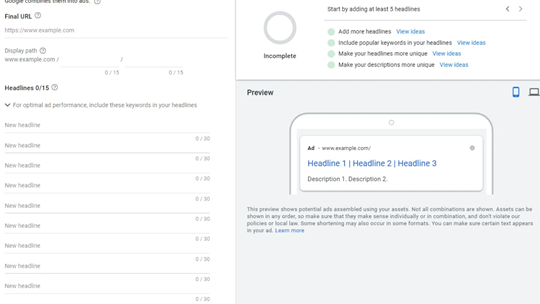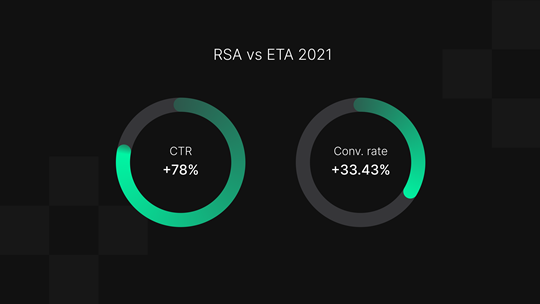Google is phasing out Expanded Text Ads in June 2022
Last year, Google announced that in June 2022 expanded text ads (ETA) will begin to be phased out of Google Ads. As a marketeer, big changes such as this are no surprise, as automation continues to grow across digital marketing.
In a similar fashion to when Google removed text ads during 2018 and 2019, as of June 30th 2022 it will no longer be possible for digital marketers to create or edit expanded text ads. Despite this announcement, this doesn’t mean that your current expanded text ads will stop showing in auction. Although Google is encouraging marketers to fully transition to responsive search ads, any current live expanded text ads will still be eligible for the ads auction. However, marketeers will be unable to make any edits to them as of June 30th.
Why Is This Change Happening?
Over the past few years, pay per click advertising has continued to evolve with automation and machine learning at its forefront. As recently as November 2021, Google introduced a new AI driven campaign type called Performance Max, which you can read about more in our recent blog. As a result, Google is phasing out expanded text ads this year, to allow marketeers to invest more time and focus into creative and top line strategy.
The introduction of responsive search ads (RSA) in 2018 was the first initial step towards this. Rather than uploading several different ad variations and A/B testing them as you would with ETAs, RSAs allow you to upload all your copy into one ad. Google will then test different headlines and descriptions to find the best combination. As a result, this saves marketeers time which can be invested elsewhere.
What Are Responsive Search Ads?
Google states that “Responsive search ads let you create an ad that adapts to show more relevant messages to your customers” and that's exactly what they do. Responsive search ads contain 15 headlines, as opposed to 3 headlines, accompanied by 4 descriptions, as opposed to 2. Although it is not a requirement to have all 15 headlines and 4 descriptions, it is certainly recommended.

Google uses its machine learning to serve a responsive search ad depending on the ad quality and relevancy to the user's search query. Using AI, Google will analyse your responsive search ad and select the most relevant and best assets (headlines and descriptions) to serve to the user on the search engine results page (SERP). Using its machine learning over time, Google will test different variations of headlines and descriptions to find the variations which are more likely to get clicked on by your target audience.
With RSAs allowing you to add more of a variation to their ads in comparison to ETAs, as well as the machine learning benefits they have, historically RSAs do tend to drive better results in comparison to ETAs. In fact, for one of our clients in 2021 RSA ads drove a 78% higher CTR, as well as a 33.43% higher conversion rate.
If, like us, you like to have as much control over your ads as possible, you're in luck. Responsive search ads allow marketers to pin specific headlines and descriptions to their desired position on the ad (i.e. Headline 1, Description Line 2 etc).

When Should You Transition To Responsive Search Ads?
In 2019, Search Engine Journal reported that 84% of marketers either used or had plans to use responsive search ads, a figure which is most likely much higher in 2022. If you are part of the small percentage of marketers yet to take advantage of responsive search ads, We highly recommend that you do as soon as possible, ahead of Google expanded text ads going away in June 2022. Between now and the end of June we would recommend beginning to create at least one responsive search ad per ad group, so your account can begin collecting data in the build up to the transition. Furthermore, this will also give you time to get used to the ad type which will likely be the go to pay per click ad type moving forward.
Will This Impact My Brands PPC Strategy Moving Forward?
The announcement by Google to begin phasing out expanded text ads in June 2022 won’t impact your brands PPC strategy too much. The transition away from ETAs and towards RSAs is designed to save marketeers time, by using their AI to test and find the best ads to serve to your target audience. This upcoming change will allow marketers to spend less time on split testing ad copy and free up time to focus on your accounts overall strategy.
Final Thoughts And TakeAways
With automation continuing to grow within digital marketing, perhaps at no faster pace than within the paid search world, unsurprisingly, we are now beginning to see PPC ads fall into this category. June 30th 2022 is just around the corner now and as such, if you haven't already begun to utilise responsive search ads within your PPC campaigns you need to do this as soon as possible ahead of the upcoming change.
If you have any questions around responsive search ads, or need help taking your paid search strategy to the next level, please get in touch with our experts today.
Where would you like to go?
We’d love to understand more about your business needs and challenges. Talk to a team of exciting minds and create a collaborative partnership focused on driving growth for your business.
